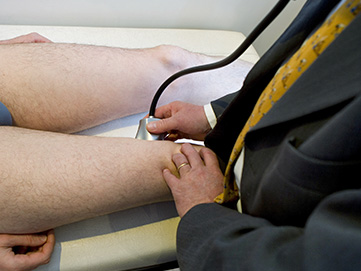General Overview
 Heart and Vascular Clinic’s peripheral vascular disease clinic is run by experienced and skilled doctors with years of experience treating the condition. Characterized by narrowed and blocked peripheral blood vessels, this condition is also known as arteriosclerosis and successful treatment is undertaken through the treatment of the affected blood vessels.
To do this we undertake comprehensive tests when necessary to identify these vessels and then prescribe the necessary treatment to correct the blood flow within these vessels.
Heart and Vascular Clinic’s peripheral vascular disease clinic is run by experienced and skilled doctors with years of experience treating the condition. Characterized by narrowed and blocked peripheral blood vessels, this condition is also known as arteriosclerosis and successful treatment is undertaken through the treatment of the affected blood vessels.
To do this we undertake comprehensive tests when necessary to identify these vessels and then prescribe the necessary treatment to correct the blood flow within these vessels.
Types of Services Offered
To treat peripheral vascular disease, our practitioners will begin by undertaking to understand your complete medical history and then follow this up with diagnostic tests to confirm the severity and prevalence of the condition in your body. Tests that will be used to diagnose peripheral vascular disease (PVD) include:- Pulse check in legs and feet
- Doppler Ultrasound
- Ankle-brachial index (ABI)
- Exercise ABI
- Pulse volume recording (PVR)
- Sensilase
- Peripheral Angiography
- Magnetic resonance angiography (MRA)
- Computerized tomography angiography (CTA)
Lifestyle changes: To reduce your risk of developing PVD, our doctors may suggest some lifestyle changes you will need to make such as abstaining from smoking, eating a balanced diet, doing regular exercise and controlling your blood pressure and blood sugar levels.
Medication: Taking certain medicines such as cilostazol, clopidrogel, atorvastatin, simvastatin, and others helps effectively treat and manage PVD during its initial stages.
Invasive procedures: Some significantly developed artery blockages may require invasive procedures to restore blood flow to peripheral blood vessels. These procedures include atherectomy, angioplasty, which are performed on patients who may not benefit from other non-invasive treatments. Sometimes they may need bypass surgery. According to the American Heart Association (AHA), PVD affects between eight and twelve million Americans. With these statistics, we understand the pressing need for exceptional and effective PVD treatment in Newark. As such, with the many years of experience our healthcare providers have handling this condition and successfully treating patients, we are able to help new patients resume their normal lives. The outcome is that we see our patients confirm that their legs feel strong after visiting the peripheral vascular disease clinic in Newark and getting treated. In addition, the aftercare guidelines we offer help them gain long term relief from the effects of the condition.
